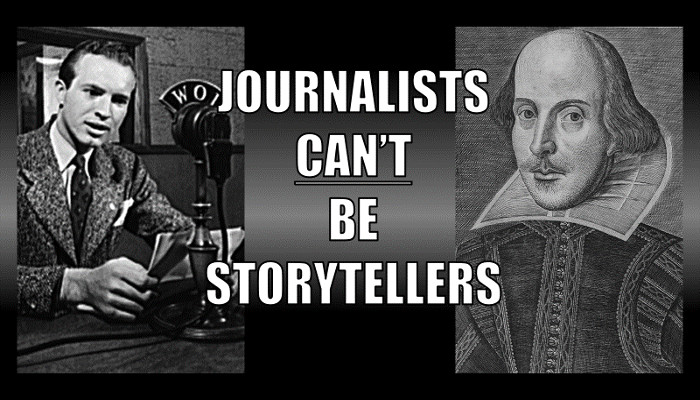
The statement, “journalists make the best storytellers” has always confused me. My issue comes from the their duty to report facts, which would limit them to narrative instead of storytelling. Journalists have an allegiance to the facts over their audiences.
Don’t take my word for it. Robert Siegel, famed co-host and journalist from NPR’s All Things Considered, described the difference between journalists and storytellers in an interview that he gave to Park Howell on Episode #140 of the Business of Story Podcast.
In the clip, Siegel recalls a conversation he once had with Ron Howard about his movie, A Beautiful Mind. Siegel asked Howard why a specific scene from Silvia Nasar’s book of the same name didn’t make it into the movie. Howard explained that “…it wasn’t part of the story line—the arc that we were choosing…” because he worried about losing the audience to it.
Here’s what the retired journalist had to say about Howards’s answer:
“For Ron Howard, a great filmic storyteller, to maintain the sympathy of the viewer…he crafted…a story…that omitted a…pretty salient fact about Nash’s life… There’s the difference between being a storyteller and a journalist; we (journalists)…can’t decide that if I leave out this salient fact from the story that people will listen longer. And in fact, we’re obliged…to find the point that might be hard to reconcile, that might disabuse a listener about some assumption about it, to probe to where…this story gets tough…It’s a big difference. And I think the challenge…for a journalist…is to be very mindful of the facts that we have to include in the story. Where we have to acknowledge where we got something from, even though that might harm the flow of the storytelling…but we’re bound to do that. We can’t just chuck it out because the story would be more streamlined and easier to follow.”
And hence my confusion. Journalist can’t be storytellers—by definition. Siegel is clear: journalists have an obligation to the facts; storytellers have an obligation to the audience and never the twain shall meet. If a journalist chooses to omit certain facts out of deference to the listener, then they’ve not only broken their sacred vow but may have ventured onto the slippery slope of activism. We might call such a leap as “fake news.”
Pandering to a particular audience by selectively editing the facts is more insidious than publishing bogus facts. We see this everyday with the cable news networks, for example, as both Fox News and CNN hand select facts that play well to their respective right and left-leaning audiences.
Journalists are beholden to facts. Storytellers are beholden to their audiences. While storytellers have more latitude than their journalism cousins, they too have their own code of ethics as we covered in Storytellers Tackle Ethics with DOTS. Storytellers are free to modify (D)etails, (O)rder, (T)ime and make (S)ubstitutions, as long as those substitutions serve the listener as opposed to the storyteller.
The one trait that journalists and storytellers share is the ability to write. The best journalists are masters of narrative. The best storytellers are masters of life and the human condition.
And never the twain shall meet.
Photo Credits: Delano, Jack, photographer. Don Jackson, a senior, delivering a news broadcast at the Iowa State College radio station. 1942. Library of Congress